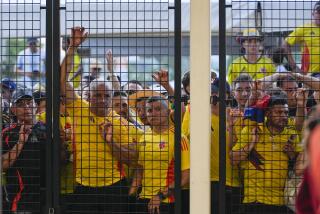WORLD CUP USA ’94 / THE FIRST ROUND : It Was a Time When Words Weren’t Needed : Reaction: The deafening sound of silence sums up the devastation felt in soccer-crazed Colombia.
- Share via
BOGOTA, Colombia — Perhaps it was the silence that was most telling.
Stunned, mouths ajar, arms crossed and slumped in chairs, Colombians watched in utter disbelief as their national team, their team of hopes and heroes, lost to the United States, 2-1.
By the end of the World Cup upset, they didn’t even bother to shout at their television sets. They just stared.
“All our dreams came tumbling down,” said Margarita Saenz, 33, who was watching the game with friends in a home in Bogota’s colonial La Candelaria neighborhood. “It’s as if we didn’t have the right to even one fantasy.”
Colombians had anticipated Wednesday’s match at the Rose Bowl with full confidence, convinced they would win and knowing they had to. To understand how hard the fall was, one must understand how important the sport is in this soccer-crazy country.
The World Cup eclipsed Colombia’s presidential election last weekend, which received a fraction of the coverage and attention given soccer. The winning candidate used Carlos Valderrama in his television advertising. In the middle of a huge political scandal rocking Colombia’s government this week, President Cesar Gaviria took off for Los Angeles to see his team.
Businesses and stores rearranged their schedules to accommodate the matches. Taxi drivers stopped working to tune in to live broadcasts of every game--not just Colombia’s performances.
It seemed as though Colombians were investing their national well-being and their aspirations for the future in the World Cup. This was one event that a country usually forced to deal with brutal drug wars and the world’s highest homicide rate could celebrate and relish.
“We had all our hopes on the team,” said Iliana Pineros, a shopkeeper. “The defeat is a national trauma.” She was watching the game with her 8-year-old nephew, Michel, who was dressed in a miniature team jersey with Adolfo Valencia’s No. 11.
Wednesday’s loss, which virtually eliminates Colombia from the tournament, was especially painful because expectations had been so high. And because Colombians, never in a million years, expected to lose to “the gringos.”
“If it had been Argentina or Brazil or Italy, that would have been one thing,” said Alfonso Barrios, a security guard who handles the bomb-sniffing dogs stationed outside shopping malls and hotels in the Zona Rosa. “The United States is a team without history, without resonance. We all knew we were going to win this one.”
In the Candelaria, a picturesque neighborhood of pitched cobblestone roads and red-tile roofs, a group of friends gathered in a courtyard of a private home to watch the game. Like Colombians everywhere, they were aware that the only option was to win.
“The team has to win,” a member of the group, Carlos Rios, said before play started. “If they don’t, they won’t be able to come back. They’ll have to look for work in a factory over there (in Los Angeles).”
Colombian television reported that the family of team member Gabriel Jaime Gomez was threatened with death if he played. He was consequently benched, and some fans here said they thought the threats might have unsettled the whole team.
The Colombian government earlier in the week banned the sale and public consumption of alcohol and prohibited citizens from carrying guns before, during and after all of Colombia’s matches. The measure was aimed at cutting down on murders and traffic deaths that routinely occur after Colombia’s games--especially after the victories.
For a couple of hours after Wednesday’s loss, Bogota remained enveloped in its shocked silence. But as midnight approached--and the dry laws lifted--the streets of Zona Rosa and other parts of Bogota’s well-to-do northern neighborhoods filled with noisy celebrants wrapped in the Colombian flag and wearing the ever-present Valderrama wigs. They pushed through the streets in caravans, car horns and radios blaring, as though they actually had something to celebrate.
“1998!” they shouted.
Times special correspondent Steven Ambrus in Bogota contributed to this story.
More to Read
Go beyond the scoreboard
Get the latest on L.A.'s teams in the daily Sports Report newsletter.
You may occasionally receive promotional content from the Los Angeles Times.







